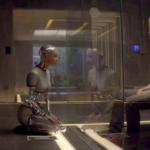“Deus ex machina” – “God from the machine”
There are no truly utopian scifi films, and if there were they would probably be very boring – something akin to Nazi propaganda movies maybe? The fact is that we take a good measure of schadenfreude from watching the façade crack and a dystopian reality emerging, along with the wilful hero(ine) who defies every obstacle placed in her way. Nothing is ever as perfect as its creators want it to be, and the elements they usually overlook are random chance and free will.
In that respect, Ex Machina contains cues and motifs that will sound familiar: AI (Artificial Intelligence) causing a battle of minds and wills, but how it treats them is, if not entirely unique then certainly distinctive. Sure, there are plenty of similar movies: to choose but one example among hundreds, you may well have seen Blade Runner, and if you have then the scenario will be entirely familiar.
There the replicants are designed to do menial jobs. In this case, the whole objective is more philosophical: it’s not that the robots could not do meaningful work, indeed they are hugely capable – it’s that their creator does not entirely trust them or their motives. Has he created a Frankenstein’s monster and equipped them with genuine intelligence, such that they might, someday, find a way to overthrow mankind? OK, that question is not posed here, but we’re at the first steps along the path in the form of an intellectual game.
Sure, a machine can be a rational agent, capable of learning and mimicking decision-making processes, but the test in EM is whether AI is truly capable of true intelligence? This can be demonstrated if the machine proves capable of Machiavellian reasoning in order to achieve its own objectives – by saying one thing and meaning another, for example… or are only humans capable of devious and manipulative behaviour?
Talking of intelligence, I like enormously the perspicacity of Alex Garland‘s film, which in the final instance is what distinguishes it from many in the same genre – indeed it is no surprise that the movie adopts chess as a metaphor (ie. can the chess computer play the game, but is the computer aware that it is playing a game?), this being a game in which the superior intellect invariably outwits the also-ran, often by kidding them that they are on top.
Also greatly to be admired are the visuals. The bulk of EM takes place at the remote (can only be approached by helicopter) modern electronic palace of deceptively laconic Internet billionaire Nathan Bateman (Oscar Isaac), set among the most ravishing scenery (Norway, so I hear) you can possibly imagine – yet the same building, where doors are protected by programmed pass cards, hides subterranean windowless depths that allow for claustrophobic scenes – but then fear of being trapped and escaping is a key motif here.
Another theme is in the form of the surveillance culture and the are-they-real-or-are-they-fake power cuts, restored a minute later but with a twist that we don’t know whether the ever-present cameras were working or not in the meantime. As such, this is a splendid metaphor for CCTV society and our habit of using devices to film our every action too – you simply never know when it’s safe to strip off the veneer and speak openly, and even then whether others are being as transparent with you – and the use of a robot with very transparent belly, arms and legs (pending the application of skin so she looks like a real woman) is not accidental.
How did this scenario occur, you may wonder? One of Bateman’s employees, Caleb Smith (the excellent and deceptively naive Domhnall Gleeson) apparently wins a competition to spend a week visiting the charismatic and iconic guru of the Blue Book search engine (sound familiar?), whose remote life is supported only by the Japanese speaking Kyoko (Sonoya Mizuno.) Of course, there is way more to it than that, but to learn more Smith has to sign a lengthy NDA (non-disclosure agreement), which then allows him to find out about Bateman’s secret project.
Ava the humanoid robot equipped with cutting edge AI (the stunning Alicia Vikander), apparently trapped in a glass prison, but able to talk to Smith through the glass in their arranged meetings in which they feel out one another and Ava swats aside Smith’s early attempts at patronising superiority with assertive eloquence.
At first this is a novelty, but with each encounter the more apparent it becomes that Bateman’s motives and his reasons for choosing Smith have not been revealed, in spite of his boss’s disarming frankness. Ava passes the Turing test with flying colours, but Bateman questions whether Smith can relate to her at an emotional level in spite of knowing that she is a robot.
In short, is he attracted to her, does he want sex with her – is she using feminine wiles to distract his attention? Smith, credit to him, is not so blind that he can’t see through this cunning stunt, and confronts Bateman – but in the final instance he can’t resist Ava – she is his nemesis.
Later Smith and we discovers Kyoko is also a robot… and that there is a programme for making even better robots, which might result in Ava’s “death.” His reaction inspires the denouement of this fascinating and tight-knit psychological thriller/drama, which demonstrates just how far Bateman has underestimated his guest and his robot.
While they are light years apart in technology, there is something of the Sleuth in the power-distance relationships explored by Garland’s film. Where Olivier and Caine vie for supremacy in the set-piece mind games, Ex-Machina is a three-handed battle for power, though who is the winner, who the stooge and who the narcissist you will have to guess for yourself, but there is only one truly smart guy in the room – and it’s not necessarily the one who thinks he is smart either.
Yes there are flaws – like the fact that Ava will need recharging once away from the retreat, and in any case the helicopter pilot would be looking to take Smith rather than a beautiful woman, but we can forgive the odd lapse in logic. Warmly recommended and deserving of several viewings, an honour I do not accord very often.













